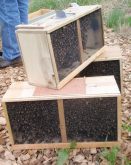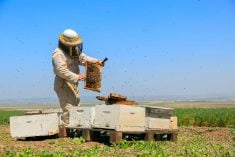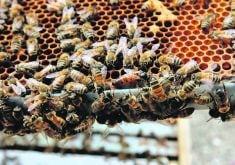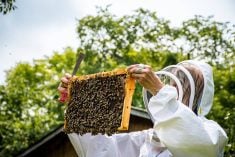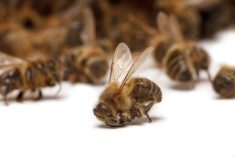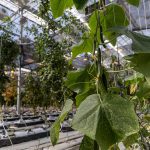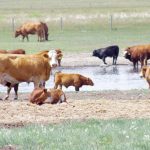Manitoba beekeepers welcomed warm temperatures and blue skies at the inaugural Manitoba Honey Bee Day, even though clouds hover over the industry.
“The industry is in flux, but I wouldn’t say we’re in crisis mode yet,” said Mike Clark, director with the Manitoba Beekeepers’ Association (MBA), adding that “it’s becoming increasingly difficult to be profitable from a commercial perspective.”
Why it matters: Varroa mites, winter losses and pest resistance are ongoing conversations in the honey sector.
Read Also

Manitoba sunflower plant gets local owners
Scoular’s sunflower and bird feed plant in Winkler, Man., bought by Orenda Commodity Services Ltd. out of Ste. Agathe.
Manitoba Honey Bee Day was organized to raise public awareness of those issues and get more traction as the industry looks for solutions.
“We engage with the beekeepers in our organization, but if we want change, it doesn’t really help to talk to our members,” said Clark. “We need to start advocating to the public and to governments for changes within the industry.”
The MBA, Brandon Area Beekeepers Association and Red River Apiarists’ Association joined forces to launch the event. Beekeepers, government officials and the public came together at the Little Brown Jug Brew Pub in downtown Winnipeg May 29. The pub also supplied the drink of the day with its Golden Ale, a Belgian brew flavoured with Manitoba honey.
Manitoba Agriculture Minister Ron Kostyshyn was one of several speakers at the event. He discussed disease and climate change impacts to the industry in recent years and noted the AgriStability program available through the federal and provincial governments is meant to mitigate farmer risk.
“I know the insurance programs are never enough but I just want to assure you that the province of Manitoba and the federal government can help out,” he said.
Provincial apiarist Derek Micholson also talked about the challenges facing beekeepers.
“The industry has faced some tough winters over the last couple of years and, unfortunately, it seems that this winter may be another tough one.
“Keeping bees and keeping bees alive has become a much more difficult task than it once was. I know some beekeepers out there are really struggling to stay afloat.”
Clark noted several areas in which action is needed from various levels of government. Federally, more testing for fraudulent honey — cheaper products adulterated with sweeteners like rice and corn syrup — would be welcome. The 2021-22 Food Fraud Annual Report from the Canadian Food Inspection Agency found that 22.5 per cent of honey samples tested in that fiscal year did not pass muster.
Clark said governments can also play an important role at the municipal level.
“If we can engage the government so that, instead of planting grass on roadsides, they plant with a wildflower mix, it would change the game for us and for farmers,” said Clark. “They would have pollinator habitats surrounding every field. So it’s a win, win for everyone.”






